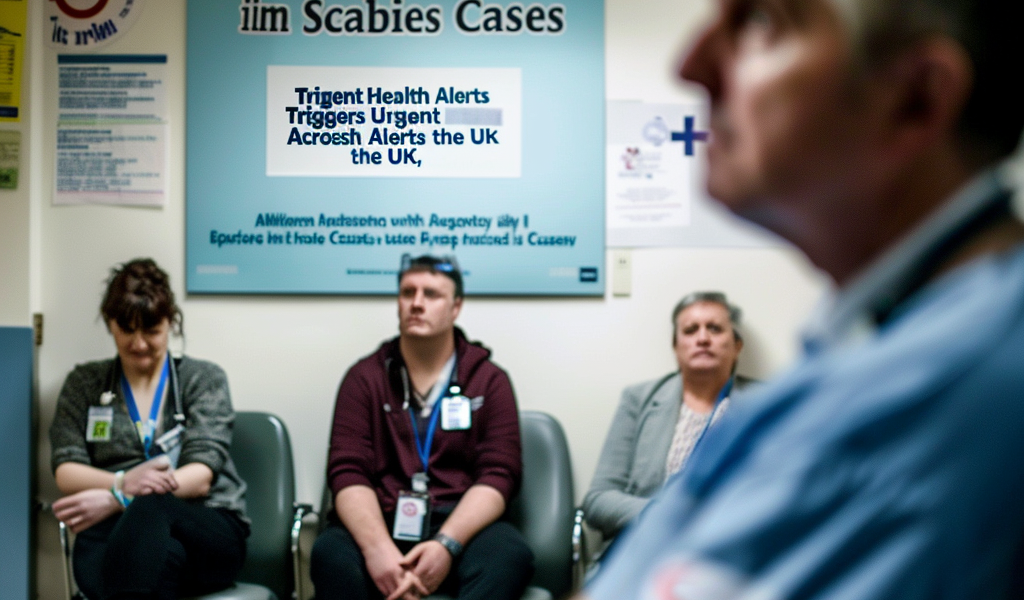Surge in Scabies Cases Triggers Urgent Health Alerts Across the UK
Health authorities in the United Kingdom are sounding the alarm as they report a significant rise in scabies cases, prompting urgent public health warnings. With over 3,600 confirmed cases of this highly contagious skin condition, the numbers reflect a worrying increase from previous years, raising concerns about potential outbreaks, particularly in communal living environments.
The latest statistics from the National Health Service (NHS) reveal that 3,689 cases of scabies were recorded up to April this year, compared to just 2,128 cases during the same period last year. This dramatic rise has not been seen frequently in recent times and has raised flags among medical professionals.
Professor Kamila Hawthorne, chair of the Royal College of General Practitioners (RCGP), noted that the rate of scabies presentations has surpassed the five-year average, with a notable spike in northern England. The increase in cases has prompted health officials to issue strong recommendations for early treatment, particularly in light of the social stigma often associated with the condition.
Scabies is caused by the mite Sarcoptes scabiei, which burrows into the skin, laying eggs and resulting in intense itching. The condition is highly contagious and spreads easily through direct skin-to-skin contact or by sharing contaminated items such as bedding and clothing. Vulnerable groups, including students living in close quarters and residents of nursing homes, are especially at risk.
Symptoms of scabies typically include red, itchy spots that can become particularly severe at night. The rash can appear anywhere on the body but is often found in areas such as between the fingers, on the elbows, and around the genital region. Infants may experience rashes on the scalp and face. One of the challenges in identifying and reporting scabies cases is the delay in symptom onset, which can take weeks after initial contact with the mites.
Health officials are increasingly concerned about the psychological barriers that prevent individuals from seeking treatment for scabies. Many people may hesitate to visit their doctor or pharmacist due to fears of judgment, believing that scabies is a condition associated with poor hygiene. This misconception is categorically untrue, as anyone can contract scabies regardless of their hygiene practices.
Professor Hawthorne emphasized the need to address the stigma surrounding scabies, stating, “There’s no reason for people to feel ashamed if they contract scabies. It is not caused by lack of hygiene—a common misconception. Anyone can catch it.”
To combat the rising cases of scabies, health authorities are encouraging individuals to seek treatment promptly and not to let stigma deter them from getting the help they need. Early intervention is crucial in managing the spread of the condition and ensuring that affected individuals receive appropriate care.
Public health campaigns are being launched to raise awareness about scabies, its symptoms, and the importance of seeking timely treatment. These campaigns aim to dispel myths about the condition and educate the public on how it spreads, thereby reducing the stigma associated with it.
In addition to raising awareness, health officials are also working to ensure that healthcare providers are equipped to deal with the increasing number of scabies cases. This includes providing training on how to recognize the symptoms and how to offer appropriate treatment options.
As the situation develops, health authorities continue to monitor the trends in scabies cases closely. They are urging anyone who suspects they may have scabies or has been in close contact with someone diagnosed with the condition to seek medical advice without delay.
With the rise in cases, the message from health officials is clear: early treatment is essential, and there is no reason to feel ashamed about seeking help. The focus remains on controlling the outbreak and ensuring that those affected receive the care they need.
As communities grapple with this public health challenge, the importance of understanding and addressing the social stigma surrounding scabies cannot be overstated. By fostering an environment of openness and support, health authorities hope to encourage more individuals to come forward and seek treatment, ultimately curbing the spread of this contagious skin condition.





